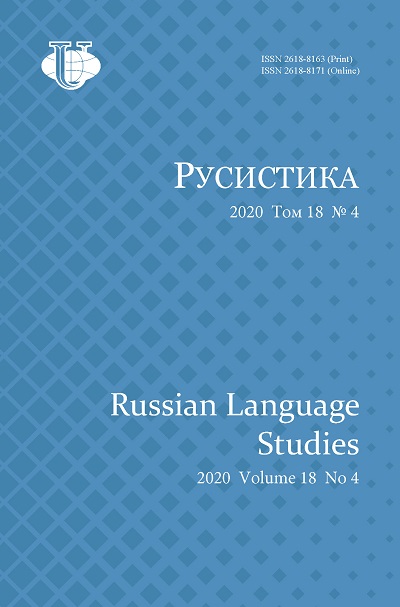Forming a methodical thesaurus of a foreign author of a manual on Russian as a foreign language
- Authors: Farysenkova L.V.1, Zhellali E.I.1
-
Affiliations:
- Lomonosov Moscow State University
- Issue: Vol 18, No 4 (2020)
- Pages: 422-438
- Section: Methods of teaching russian as a non-native and foreign language
- URL: https://journals.rudn.ru/russian-language-studies/article/view/25356
- DOI: https://doi.org/10.22363/2618-8163-2020-18-4-422-438
- ID: 25356
Cite item
Full Text
Abstract
The article aims at investigating the specifics of the modern practice of training foreign authors of Russian as a foreign language (RFL) textbooks and identifying the prospects for the formation of a professional thesaurus of this group on the basis of modern educational technologies. This issue is really relevant, since, as it is shown in the article, there are currently almost no methodological studies and manuals addressed to this group of trainees. At the same time, practice shows that foreign colleagues are in urgent need of diverse methodological support from Russian methodologists. The paper shows that in 1970-1980-s, when such support was purposefully implemented, modern textbooks on RFL were created in foreign countries, which contributed to the Russian language spreading in Europe, Asia and Africa. The research materials were textbooks on the Russian language for foreigners, which marked a certain stage in teaching methods of RFL development. The authors of the article rely on general scientific theoretical research methods: comparative analysis of available sources of information, comparative analysis of the conceptual system of the topic under research, synthesis of their own points of view (or positions), based on the analysis of various ways of solving the problem. The article resulted in the proposed topic of training and consulting materials for potential foreign authors of RFL textbooks, which are supposed to be based on the developed electronic platform, as well as the introduction of materials of the round table “Designing a communicative textbook of RFL” into the system of professional training and advanced training. The authors concluded that potential foreign authors of RFL textbooks are currently in urgent need of systematic scientific and methodological support. In this regard, it is recommended to intensify work with this contingent, using the potential of domestic methodological research, both classic and modern.
About the authors
Lyubov V. Farysenkova
Lomonosov Moscow State University
Author for correspondence.
Email: fartom1@yandex.ru
Doctor of Pedagogy, Professor of the Institute of Russian Language and Culture of the Lomonosov Moscow State University. Research interests: textbook on Russian as a foreign language, methods of teaching Russian as a foreign language, Russian as a foreign language
24/35 Krzhizhanovskogo St, bldg 1, Moscow, 117218, Russian FederationElnura I. Zhellali
Lomonosov Moscow State University
Email: melnura@yandex.ru
Candidate of Pedagogy, senior lecturer of the Institute of Russian Language and Culture of the Lomonosov Moscow State University. Research interests: Russian as a foreign language, communicative personality, game technologies
24/35 Krzhizhanovskogo St, bldg 1, Moscow, 117218, Russian FederationReferences
- Akishina, A.A., & Kagan, O.E. (2018). Uchimsya uchit': Dlya prepodavatelei russkogo yazyka kak inostrannogo [Learning to teach: For teachers of Russian as a foreign language]. Moscow: Russkii yazyk. Kursy Publ. (In Russ.)
- Arutyunov, A.R. (1987). Sovremennye modeli konstruirovaniya, analiza i vnedreniya uchebnikov i uchebnykh posobii po russkomu yazyku: Kurs lektsii [Modern models of designing, analyzing and implementing textbooks and manuals on the Russian language: Course of lectures]. Moscow: Gosudarstvennyi institut russkogo yazyka imeni A.S. Pushkina Publ. (In Russ.)
- Arutyunov, A.R. (1990). Kommunikativnyi intensivnyi uchebnyi kurs dlya zadannogo kontingenta uchashchikhsya [Communicative intensive training course for a given contingent of students]. Moscow: Gosudarstvennyi institut russkogo yazyka imeni A.S. Pushkina Publ. (In Russ.)
- Arutyunov, A.R., Trushina, L.B., & Chebotarev, P.G. (1981). Mnogofaktornyi analiz uchebnikov inostrannykh yazykov [Multivariate analysis of textbooks of foreign languages]. Soderzhanie i struktura uchebnika russkogo yazyka kak inostrannogo [Content and structure of textbooks on Russian as a foreign language]. Moscow: Russkii yazyk Publ. (In Russ.)
- Bash, E.G., Babalova, L.L., & Dorofeeva, T.M. (1960). Uchebnik russkogo yazyka dlya studentov-v'etnamtsev [Textbook of the Russian language for students-Vietnamese]. Moscow: Vysshaya shkola Publ.
- Berdichevskii, A.L., & Golubeva, A.V. (2015). Kak napisat' mul'tikul'turnyi uchebnik russkogo yazyka kak inostrannogo [How to write a multicultural textbook on Russian as a foreign language]. Saint Petersburg: Zlatoust Publ. (In Russ.)
- Bim, I.L. (1977). Metodika obucheniya inostrannym yazykam kak nauka i problemy shkol'nogo uchebnika [Methodology of teaching foreign languages as a science and problems of school textbooks]. Moscow: Russkii yazyk Publ. (In Russ.)
- Pulkina, N.M., & Zakhava-Nekrasova, E.B. (1958). Uchebnik russkogo yazyka dlya studentov-inostrantsev [Russian language textbook for foreign students]. Moscow: Sovetskaya nauka Publ. (In Russ.)
- Shchukin, A.N. (2018). Russkii yazyk kak inostrannyi: Osnovy uchebnikovedeniya: Posobie dlya prepodavatelei i studentov-filologov [Russian as a foreign language: Fundamentals of textbook studies: Handbook for teachers and students of philology]. Moscow: IKAR Publ. (In Russ.)
- Vyatyutnev, M.N. (1974). Formirovanie teorii uchebnika russkogo yazyka kak inostrannogo [The formation of the theory of the textbook of Russian as a foreign language]. Russkii yazyk za rubezhom [Russian language abroad], (4), 61–65. Moscow. (In Russ.)
- Vyatyutnev, M.N. (1984). Teoriya uchebnika russkogo yazyka kak inostrannogo (metodicheskie osnovy) [The theory of the textbook on Russian as a foreign language (methodical bases)]. Moscow: Russkii yazyk Publ. (In Russ.)
- Zhellali, E.I. (2017). Uchet lingvokul'turnykh kharakteristik kommunikativnoi lichnosti v uchebnike RKI dlya gidov Turtsii [Accounting for linguistic and cultural characteristics of the communicative personality in the textbook of the RKI for guides in Turkey]. (Candidate dissertation, Moscow). (In Russ.)
Supplementary files














